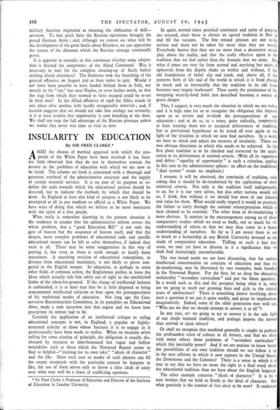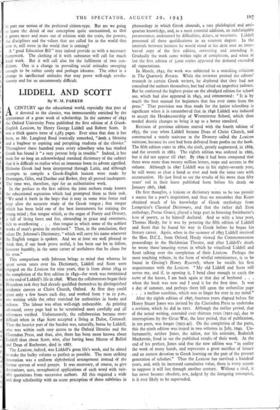INSULARITY IN EDUCATION
By SIR FRED CLARKE *
What really is somewhat alarming in the present situation is the tendency to assume that the administrative reform covers the whole problem, that a " good Education Bill " is not only the gate of heaven but the assurance of heaven itself, and that the deeper, more complex problems of educational ends and specific educational means can be left to solve themselves, if indeed they exist at all. There may be some exaggeration in this way of putting it, but even so there is truth enough to justify Some uneasiness. A searching revision of educational conceptions, as distinct from educational machinery, is not likely to prove con- genial to the English temper. In education, as perhaps in some other fields of common action, the Englishman prefers to leave the ideas which actually rule him safely out of sight in the uncriticised limbo of the taken-for-granted. If the charge of intellectual laziness is unfounded, it is at least true that he is little disposed to bring concentrated intellectual criticism to bear upon the presuppositions of his traditional modes of education. Not long ago the Con- servative Reconstruction Committee, in its pamphlet on Educational Aims, made a rash incursion into that region and we know how precipitate its retreat had to be.
Certainly the application of an intellectual critique to ruling educational concepts is not, in England, a popular or highly- esteemed activity, as those whose business it is to engage in it professionally have been made to realise. When an occasion arises calling for some citation of principle, the obligation is usually dis, charged by recourse to time-honoured but vague and hollow rotundities such as those which the Norwood Report seems to find so helpful—" learning for its own sake," " ideals of character " and the like. Since each user or reader of such phrases can fill the empty receptacle with the particular content he happens to like, the use of them serves only to throw a false cloak of unity over what may well be a chaos of conflicting opinions.
*Sir Fred Clarke is Professor of Education and Director of the Institute of Education in London University. In quiet, normal times practical continuity and unity of purpose are secured, since there is always an agreed tradition to flow in and fill the vacuum. The fine rotund phrases are not really serious and must not be taken for more than they are worth. Everybody knows that they are no more than a decorative word- play above the reality, and that the really effective agent is the tradition that we feel rather than the formula that we utter. But what if times are very far from normal and anything but quiet, if upheavals from the depths shake us within and without, if the old foundations of belief slip and crack, and, above all, if the patterns both of life and of the world in which it is lived change so much and so irrevocably that the tradition in its old form becomes very largely irrelevant? Then surely the persistence of the easygoing security-bred habit just described becomes a source of grave .danger.
This, I suggest, is very much the situation in which we are today, and it is high time for us to recognise the obligation this imposes upon us to review and re-think the presuppositions of our education ; and to do so, in a sense, quite radically, temporarily at least treating them not as accepted deliverances of tradition, but as provisional hypotheses to be tested all over again in the light of the situation in which we now find ourselves. In a word, we have to check and adjust the excesses of insularity. There are two obvious directions in which this needs to be achieved. In the first place tradition is to be checked and corrected by the appli- cation to its deliverances of rational criteria. (With all its vagueness and defect " equality of opportunity " is such a criterion, applied in this case in the administrative sphere: its effect on the traditional " dual system " needs no emphasis.) I assume, it will be observed, the continuity of tradition, only asking that it should be de-insularised by the application of more universal criteria. Not only is the tradition itself indispensable to us, for it is our very selves, but also other nations would tell us, I think, that without it we should lose most of our interest and value for them. What would really imperil it would be precisely the failure to carry through the rational reinterpretation which is here claimed to be essential. The other form of de-insularising is more obvious. It consists in the encouragement among us of those comparative studies which we need so badly, not so much for the understanding of others as that we may thus come to a better understanding of ourselves. So far as I am aware there is not so much as a lectureship in any British University devoted to the study of comparative education. Trifling as such a fact may seem, we may yet have to discern in it a significance that we shall find increasingly uncomfortable.
The two broad needs we are here discussing, that for serious intellectual concentration on concepts of education and that for de-insularising, may be illustrated by two examples, both handled in the Norwood Report. For the first, let us drop the obscuring technicality " secondary curriculum" and put the blunt question: In a world such as this and the prospect being what it is, what are we going to teach our growing boys and girls in the critical years of adolescence? There is something almost terrifying about such a question if we put it quite starkly, and grasp its implications imaginatively. Indeed, some of the older generation may well say, " Who are we that we should attempt to answer it at all "?
In any case, are we going to try to answer it in the sole light of our single national tradition, and perhaps impose the answer thus arrived at upon others?
Or shall we recognise that mankind generally is caught in perhaps the profoundest crisis of culture in all history, and that we share with many others those problems of " secondary curriculum " which this inevitably poses? And if we are anxious to know better the possibilities of our own tradition should we not follow it up in the new editions in which it now appears in the United 'States, the Dominions and the Colonies? There is a sense in which it is true to say that we have no more the right to a final word about the educational tradition than we have about the English language.
The other example concerns " ideals of character." It is by a sure instinct that we hold so firmly to the ideal of character. But what precisely is the content of that ideal to be now? It enshrines in part our notion of the preferred citizen-type. But are we going to leave the detail of our conception quite unexamined, so that it grows more and more out of relation with the traits, the powers, the disciplines and the values that are called for in the world that now is, still more in the world that is coming?
A " good Education Bill " may indeed provide us with a necessary framework. The clothing of it with substance will call for much hard work. But it will call also for the fulfilment of two con- ditions. One is a change in prevailing social attitudes sweeping enough to be rather costly and perhaps irksome. The other is a change in intellectual attitudes that may prove well-nigh revolu- tionary and for us uncommonly difficult.



























 Previous page
Previous page